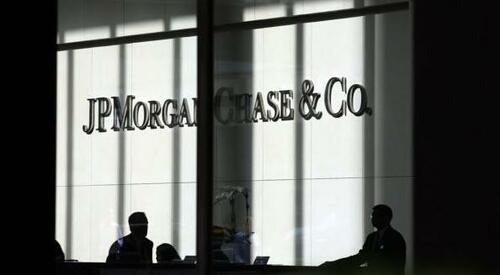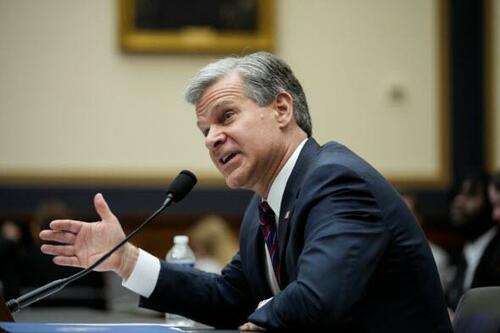Banks Take The Lead In Establishing Personal Social Credit System, Critics Charge
Authored by Kevin Stockland via The Epoch Times,
Large money-center banks appear to be in the vanguard of a movement to build a system of personal social credit scores.
This week, British bank Barclays became the latest to be accused of shutting the accounts of its customers for political or religious reasons. This followed revelations in April that Coutts, a private bank owned by British Bank NatWest, was alleged to have closed the accounts and publicized personal information of conservative politician Nigel Farage, one of the foremost Brexit advocates and a supporter of the policies of former U.S. President Donald Trump.
And British banks are not alone. Many say that America’s largest banks are in lockstep with UK banks in establishing political and social criteria for their customers, and punishing those who don’t comply.
“Sadly, what we’re seeing now with NatWest and Barclays isn’t surprising,” Justin Haskins, director at the Heartland Institute, told The Epoch Times.
“There is a mountain of evidence that shows many of America’s largest and most powerful banks are discriminating against customers because of their ideological, social, cultural, religious, or political views.”
“Through various environmental, social, and governance (ESG) policies and frameworks, banks regularly choose to screen out customers who are deemed ‘reputational risks’ or considered part of industries disfavored by elites and their powerful institutions,” Mr. Haskins said.
UK Ministers Find Fault With Discriminating Banks
In contrast to the United States, where regulators have taken no action, UK ministers have stepped in to defend their citizens against political discrimination.
“Andrew Griffith, the economic secretary of the UK, met with some of the major banks recently and got them all to commit to a principle of non-discrimination, based on lawful expression,” Michael Ross, counsel for the Alliance Defending Freedom (ADF), told The Epoch Times.
In addition, laws are currently in works to ban UK banks from discriminating against customers on a political or religious basis.
UK Treasury Minister Baroness Penn stated last week: “I think the point that we can all agree on is that the right to lawful freedom of speech is fundamental. And where that has seemed to be brought into question through the provision of services, we have cause to worry.”
UK Foreign Secretary James Cleverly stated that the closure of Mr. Farage’s accounts was “wrong on so many levels.”
“This completely undermines the trust we have in our banking and financial systems,” Mr. Cleverly said. “We are better than this.”
UK Home Secretary Suella Braverman posted to Twitter on July 19: “The Coutts scandal exposes the sinister nature of much of the Diversity, Equity & Inclusion industry. Apparently anyone who wants to control our borders & stop the boats can be branded ‘xenophobic’ & have their bank account closed in the name of ‘inclusivity.’”
The headquarters of the private bank Coutts in London on July 28, 2023. (HENRY NICHOLLS/AFP via Getty Images)
As part of the new UK regulations, banks that close customer accounts will be required to give a reason, and customers will have the right to appeal the bank’s decision. Banks who continue to discriminate may lose their licenses.
Meanwhile, British banks themselves appear to be turning against these policies, or at least of the unfavorable publicity they are now facing as a result.
On July 26, NatWest Chief Executive Alison Rose resigned after Mr. Farage’s allegations were substantiated and it was revealed that she had discussed Mr. Farage’s details with BBC news. Ms. Rose stated that she was guilty of a “serious error of judgment.”
On Thursday, Peter Flavel, CEO of Coutts, also resigned, saying he took “ultimate responsibility” for the closure of Mr. Farage’s bank accounts. The UK government data watchdog has promised an investigation, sending a letter to banks to remind them that customers’ personal information should be kept private.
John Edwards, the UK’s information commissioner said: “The banking duty of confidentiality is over a hundred years old, and it is clear that it would not permit the discussion of a customer’s personal information with the media.
“We trust banks with our money and with our personal information,” Mr. Edwards stated. “Any suggestion that this trust has been betrayed will be concerning for a bank’s customers, and for regulators like myself.”
US Banks Also Discriminate, Experts Say
JPMorgan Chase, America’s largest bank, has also faced allegations of political and religious discrimination.
“We’re already seeing this happening in the U.S.,” ADF’s Mr. Ross said.
“Before this, there was obviously Sam Brownback and the National Committee for Religious Freedom,” he said, referring to accounts allegedly closed by JPMorgan Chase. “Chase also canceled Defense of Liberty a couple years ago, retired General Michael Flynn, the Family Council—all of them are designated either high risk or reputational risk.”
In May, longtime JPMorgan Chase shareholder David Bahnsen brought a shareholder action against the bank, claiming that it had closed the accounts of a religious organization established by former senator and U.S. Ambassador at Large for International Religious Freedom Sam Brownback for political reasons.
While the action ultimately failed to gain majority support from shareholders, Mr. Bahnsen stated, “One thing I am certain of is that the next time a bank manager decides to close an account for somebody like Ambassador Brownback, they’re going to think twice about doing it. This was covered far and wide by both the left wing press and the right wing press, and I do not believe it looked good upon JPMorgan.”
In November 2021, WePay, a payment services company owned by JPMorgan Chase, abruptly canceled services they were providing for Defense of Liberty, a conservative organization, for an event featuring Donald Trump Jr. WePay said at the time that they would not serve anyone who promotes “hate, violence, racial intolerance, terrorism, the financial exploitation of a crime.”
This prompted Missouri Treasurer Scott Fitzpatrick to threaten to halt state business with the bank.
People pass a sign for JPMorgan Chase & Co. at its headquarters in Manhattan in New York City on Oct. 2, 2012. (Spencer Platt/Getty Images)
In July 2021, Family Council faced similar denial of service.
“Although Family Council generally tries to avoid doing business with companies like Chase, at 10:29 am on July 7, 2021, our office received a terse email from our credit card processor—a company owned by J.P. Morgan Chase—saying, ‘Unfortunately, we can no longer support your business.’ At 10:30 AM they terminated our account, and we could no longer accept donations,” Family Council stated.
“For nearly two years we had used this company to process donations that our supporters made to Family Council and the Education Alliance via our websites. If you gave by credit or debit card, this company handled the transaction. Without a processor, it’s impossible for a nonprofit to accept donations online.”
On March 23, financial officers from 14 states wrote a letter to JPMorgan CEO Jamie Dimon expressing their “concern that the bank is engaged in what appears to be politically motivated de-banking of certain industries, individuals and groups.”
“A large number of our pension funds are direct shareholders of Chase, and as stewards of our states’ investment dollars, we are concerned that the company’s recent pattern of apparent politically motivated de-banking constitutes a breach of its fiduciary duty,” they stated. “Under the law, you and the other officers of the company must act to maximize profit and must not subordinate the company’s long-term financial well-being to extraneous personal or political ends.”
And on May 2, 19 State attorneys general wrote a letter to Mr. Dimon stating: “It is clear that JPMorgan Chase & Co. has persistently discriminated against certain customers due to their religious or political affiliation.
“This discrimination is unacceptable,” the AGs wrote. “Chase must stop such behavior and align its business practices with the anti-discrimination policies that Chase proclaims.”
Discrimination Could Spread Beyond Politics
Some say they are concerned that bank discrimination could spread beyond political and religious views to a broader social credit system that might also include things like environmental behavior and gun control.
“There is every reason to believe that current discriminatory practices in banking could soon expand to personal CO2 emissions or gun purchases,” Mr. Haskins said.
“Banks and other financial institutions have already started to discriminate with gun companies, either through higher fees or rates or by refusing to do business entirely, and every large bank in the United States, from Bank of America to Citi and Wells Fargo, have said they have started the process of phasing out CO2 emissions from their entire business model, including lending and banking services,” he said. “This will take a few decades to complete, but if these banks go through with their plans, individuals and companies that rely on fossil fuels—almost everyone today—will be greatly affected.”
“The policies they use to do this are very expansive policies, like ‘reputational risk’ or ‘politically exposed person,’” Mr. Ross said.
“There’s not really a limiting principle there, and so we can certainly see it aimed at any sort of political opponent or anyone who has views that activists or even government actors think are unpopular.”
“We’ve been carefully monitoring Chase, which de-banked General Flynn and de-banked other conservatives, then last fall de-banked Ambassador Brownback’s organization,” Scott Shepard, a director at the National Center for Public Policy Research, told The Epoch Times.
“And just this last week, they de-banked a couple of doctors who are out talking about the inefficacy of [COVID-19] vaccines, that they won’t stop transmission, that they won’t make takers immune, etc., and the bank still hasn’t explained why,” Mr. Shepard said.
“We’ve seen similar behavior at Bank of America, along with Bank of America sharing private information about the transactions of customers without warrants. And last week, we found out that that happens all the time; [FBI Director] Chris Wray says so.”
FBI Director Christopher Wray testifies during a House Judiciary Committee about oversight of the Federal Bureau of Investigation on Capitol Hill in Washington on July 12, 2023. (Drew Angerer/Getty Images)
At a Congressional hearing on July 12, Rep. Thomas Massie (R-Ky.) asked Mr. Wray: “George Hill, former FBI supervisory intelligence analyst in the Boston field office, told us that Bank of America, with no legal process, gave to the FBI gun purchase records with no geographical boundaries for anybody that was a Bank of America customer. Is that true?”
To which Mr. Wray replied: “A number of business community partners all the time, including financial institutions, share information with us about possible criminal activity, and my understanding is that that’s fully lawful.”
Some have argued that, as private companies, banks are free to do business with whichever customers they choose. However, this position has been challenged on the grounds that financial services are critical to the ability of people and organizations to be able to function in modern society.
“Banks in particular receive a ton of bailouts and public benefits from the government and from taxpayers here,” Mr. Ross said. “They do this so that they can serve the public.”
“So when they turn around and start weaponizing these financial services to cut off people with views they don’t like, they’re breaking the public trust,” he noted.
“The American banks that seem to be leading these de-banking and discrimination policies are the too-big-to-fail banks,” Mr. Shepard said. “If you’re backstopped by American taxpayers, you get to keep your profits but we cover your losses—you may not discriminate against the viewpoint of any American.”
The Epoch Times requested comments from JPMorgan Chase, NatWest, and Barclays for this article but did not receive a response by time of publication.
Tyler Durden
Tue, 08/01/2023 – 03:30
via ZeroHedge News https://ift.tt/7nTUmiI Tyler Durden


